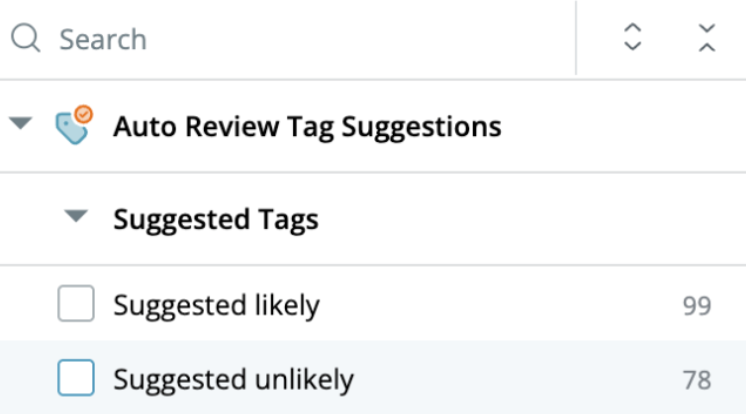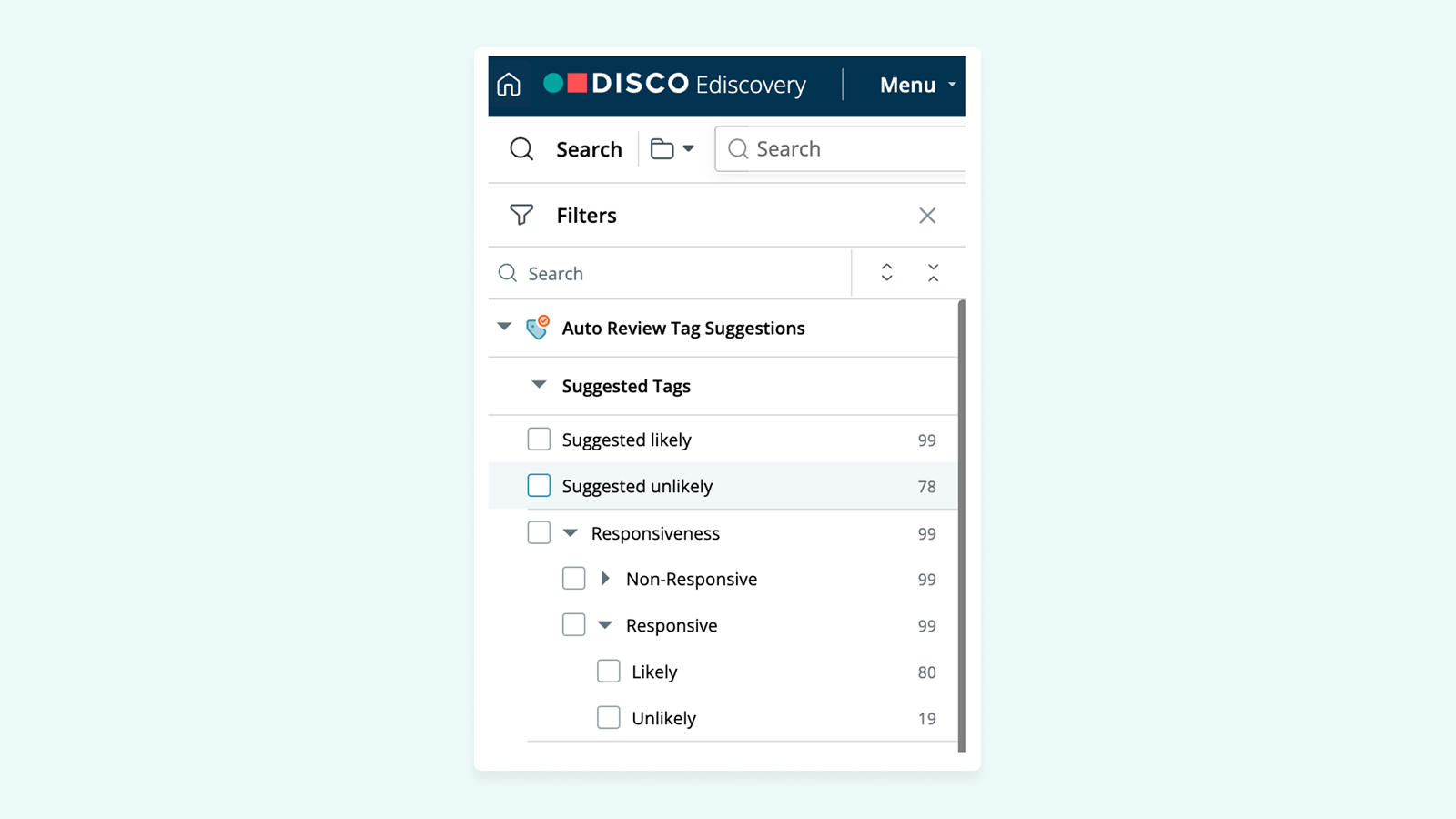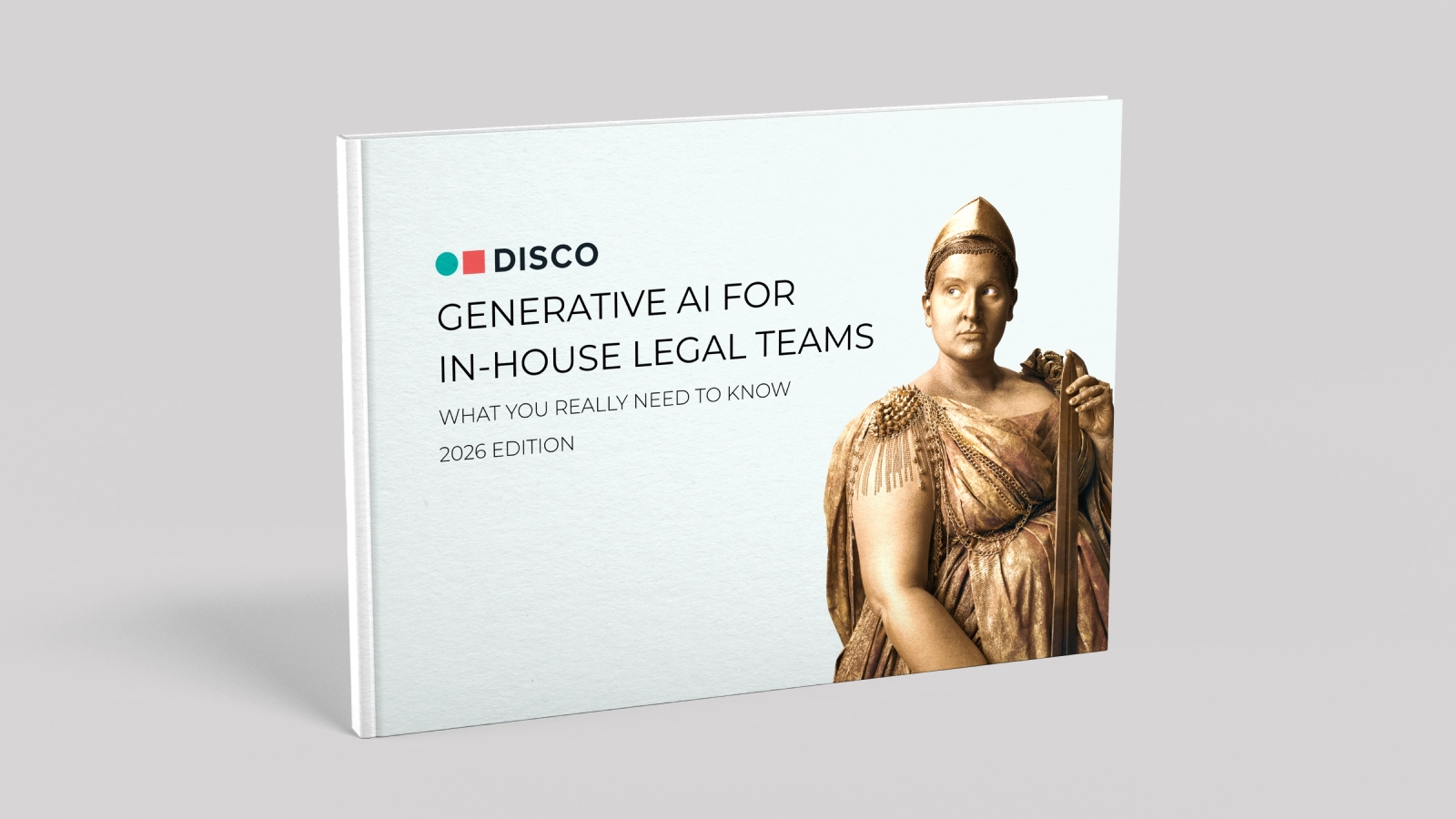⚡️ 1-Minute DISCO Download
Ten years ago, DISCO launched its AI Lab with a single goal: make discovery faster, easier, and more accurate for legal teams. What began as one engineer’s experiment has evolved into a decade of breakthroughs that continue to reshape how legal professionals engage with evidence.
💬 Key Quote
“That was the moment we realized this wasn’t just about making ediscovery faster. The system was showing us it could be more reliable than people, which completely changed how we thought about review.”
🌊 Dive Deeper
See “The Road Ahead” to learn how DISCO’s AI Lab’s next decade will go beyond discovery, applying AI to every evidence-based effort in litigation, investigation, and trial preparation.
Ten years ago, DISCO launched our AI Lab with a deceptively simple mission: to make discovery faster, easier, and more accurate for lawyers.
At the time, ediscovery was still marked by armies of reviewers, spiraling costs, and long nights spent combing through mountains of documents. DISCO’s founders believed there had to be a better way — and they set out to prove that artificial intelligence could solve one of the toughest problems in law.
Brilliant technologists with backgrounds at places like CERN and the U.S. Navy signed up for that mission, bringing their expertise to DISCO – not to chase flashy AI projects, but to wrestle with the gritty, high-stakes realities of legal work.
For these technologists, building AI for AI’s sake misses the point. The goal was – and still is – to give legal teams tools they actually want to use, tools that reduce drudgery and increase confidence in every matter. That focus has guided the Lab from its one-person beginnings to its role today as the engine of DISCO’s AI innovation.
Keep reading for the full story, plus lessons learned after 10 years of running DISCO’s cutting-edge AI Lab.
Founding vision: Why DISCO launched the AI Lab in 2015
DISCO launched our AI Lab with a singular mandate: to build technology that makes document review faster, easier, and more accurate for legal teams.
The (at the time) one-person effort focused on a specific pain point: helping reviewers cut through mountains of documents to identify the ones most likely to be relevant to a case.
The results proved that AI could take on that burden, accelerating review and improving accuracy at the same time.
“That first predictive tagging effort showed we could cut down the work and still get better results. It wasn’t just faster — it was more consistent,” recalls Rick Vestal, DISCO Director of Engineering.
From that seed, the Lab grew, adding specialists and partnering closely with DISCO Engineering to transform hard-won insights into productized workflows. Today, with Dr. Robert Harrington, DISCO Senior Director of Machine Learning and Artificial Intelligence, at the helm, the mission remains the same: solve real problems in review and discovery so legal teams can work smarter, move faster, and feel more confident in every matter.
A decade of innovation
The AI Lab’s work tells a story of steady progress and bold ideas. What began as a single engineer’s experiment has evolved into a decade of advancements that continue to expand what AI can do for legal teams.
Breakthroughs in AI review
2016: Predictive tagging and AI-assisted document review
The Lab’s first breakthrough began with a deceptively simple question: Could AI help legal teams find the most relevant documents faster?
In response, we developed predictive tagging.
When the Lab developed this capability, there were no sophisticated frameworks for working with deep learning models. By adapting models developed for image processing, we created the first technology to show that machine learning could prioritize documents based on patterns of relevance identified by human reviewers.
What is predictive tagging? By analyzing a small sample of attorney-coded documents, our predictive tagging model could predict which of the remaining files were likely to matter most. This meant reviewers could focus their time and expertise on the content that truly counted, dramatically accelerating early case assessment and large-scale discovery.
The results spoke for themselves. Predictive tagging reduced the manual burden of review, improved consistency, and laid the foundation for everything the AI Lab would go on to build.
Want to learn more? Our whitepaper explains how tag predictions bring deep learning into legal technology.
2022: Topic clustering with automatic indexing
After predictive tagging proved AI could prioritize relevance in document review, our Lab took the next step in revolutionizing legal tech for document review with topic clustering. This functionality was written from scratch using algorithms the team had read about in research papers, which they tailored to legal use cases and integrated into our ediscovery product.
What is topic clustering? Topic clustering groups relate documents by concept rather than keywords. Instead of relying solely on search terms, the technology automatically organizes data into clusters based on meaning, helping reviewers see relationships and patterns that traditional tools might miss.
This capability became a turning point for large-scale investigations and reviews. It gave legal teams a bird’s-eye view of their data from the very start, helping them explore new angles, uncover hidden connections, and build case strategy faster.
“One of the things that excites me about where we’ve gone with clustering is that it gives you a different way to understand your data,” explains Harrington. “Instead of just searching for specific words, you can see which documents are related conceptually. It’s like seeing the forest instead of just the trees.”
2023: Generative AI enters the DISCO product with Cecilia® Q&A
If topic clustering gave legal teams a new way to see their data, the AI Lab’s next major development, Cecilia Q&A gave them a new way to talk to it.
What is Cecilia Q&A? The AI assistant, which DISCO debuted publicly in 2023, allows users to interrogate their case documents using natural language – e.g., “Which executives at the company were aware of this issue before April 2002?” – and receive clear responses drawn from their case materials, with the links to the relevant documents.
By making data interrogation conversational – no search syntax or filters required – Cecilia Q&A breaks down the technical barriers that once separated lawyers from the information they needed. Now, legal teams can move from question to insight in seconds, freeing them to focus on analysis rather than document hunting.
More than just a convenience feature, Cecilia Q&A represents a mindset shift for discovery: that technology should meet the user where they are, not the other way around.
And our customers are seeing the benefits. Associate Cameron Secord at Jackson Walker LLP noted, “Here’s how much time Cecilia Q&A saves me: a task that would take 3-4 days working through the weekend now takes 3-4 hours with Cecilia."
2024: Cecilia Doc Summaries
As case data continues to grow in volume and complexity, legal teams need faster ways to grasp what’s inside a document without reading every line. The next development from the AI Lab, Cecilia Doc Summaries, delivered that efficiency.
What is Cecilia Doc Summaries? Using advanced generative models, Cecilia Doc Summaries condenses lengthy, complex documents into concise overviews. So instead of spending hours parsing dense language, reviewers can immediately understand a document’s essence — its subject, tone, and relevance — before deciding what deserves closer examination.
The outcome was a faster, more focused review process for legal teams, who can spend less time parsing long, complex documents, and more time using insights from their contents to shape case strategy.
2024: Cecilia Deposition Summaries
The deposition transcript has always been one of the most time-consuming pieces of a case — hundreds of pages, multiple witnesses, key testimony buried in dialogue and cross-examination. DISCO’s AI Lab created Cecilia Deposition Summaries to solve this very problem.
What is Cecilia Deposition Summaries? Using advanced generative AI and built-in citation linking, the feature allows users to receive summaries of depositions in minutes in the format of their choosing: quick summaries (1-3 sentences), page-line summaries with references, and topic summaries that group testimony by subject.
The result? Legal teams get immediate visibility into key admissions, witness statements, and themes without wading through every line of a transcript.
Case teams using Cecilia Deposition Summaries report a 75-98% savings in the time needed to manually summarize a deposition, from hours to minutes. With the extractable summaries and linked citations, they can rapidly identify relevant testimony, share findings with stakeholders, and proceed to motions, designations, or trial prep far earlier. The feature helps legal teams scale review, reduce costs, and increase confidence in the accuracy and narrative they build.
2024: Auto Review
2024’s Cecilia Auto Review became a turning point for the Lab — a feature that didn’t just make document review faster, but proved it could be more reliable, with skyrocketing precision and recall rates.
Harrington recalls, “When we first ran Auto Review, the assumption was that the AI would need to be checked constantly, because we expected humans to be more accurate. But when we compared the results, it flipped — the AI was consistent, and the reviewers were the ones making the mistakes.
“That was the moment we realized this wasn’t just about making ediscovery faster. The system was showing us it could be more reliable than people, which completely changed how we thought about review.”
What is Auto Review? Built on years of refinement, Auto Review is GenAI-powered doc review that uses advanced large language models to evaluate document relevance at scale — identifying key patterns, concepts, and context across entire data sets. Legal teams can now confidently move through reviews that once took weeks in a fraction of the time, with consistency that rivals or surpasses human accuracy. By pairing machine precision with human oversight, Auto Review delivers the speed of automation without sacrificing the defensibility clients depend on.
Stunning customer results with Auto Review: When an Am Law 100 firm was facing almost 100,000 highly sensitive documents to review, they turned to DISCO. Following a close partnership between the firm and DISCO's AI experts, Auto Review completed the task in a little over 4 hours – reviewing 22k docs per hour with 99.5% precision and 89% recall. Read the case study.
2025: Cecilia Definitions
In 2025, the Lab added a functionality that helps case teams heighten understanding of the contextual world of their case docs: Cecilia Definitions.
What is Cecilia Definitions? Cecilia Definitions is a capability in the DISCO product that allows users to select text to generate an AI-powered definition based only on their documents. It uses GenAI to define terms or phrases based solely on the documents in the team's database, which allows for bespoke definitions of acronyms, terms of art, codenames and more that may be unique to a particular matter.
Now, rather than crafting search terms, looking through dozens of documents, and synthesizing the results by hand, lawyers can get answers quickly, scoped specifically to their document set. In this way, Cecilia Definitions gives lawyers and legal teams the context they need, exactly when they need it, without having to leave their screen or pause their work.
Core commitments behind every breakthrough
Every advance from the AI Lab has been guided by the same commitments: transparency, defensibility, adoption, and making a real difference for legal teams.
“These commitments aren’t features we bolt on later — they’re built into our DNA. Every model we develop, every workflow we test, starts with the assumption that it has to be explainable and defensible,” says Harrington.
Transparency and defensibility as design principles
DISCO’s AI must be explainable and defensible in court. Otherwise, it’s not a legal tool. That standard of rigor has shaped every system the Lab has built, ensuring results are transparent and trustworthy.
“The real measure of legal AI isn’t how fast it runs, it’s whether you can show your work,” Harrington explains. “Lawyers need to see why the system made a decision, so they can trust it and defend it in court.”
Industry adoption shift
Over the past decade, law firms and in-house teams have moved from skepticism of AI to the realization that it can transform the practice.
“If you go to conferences, AI is all anyone’s talking about,” says James Park, DISCO Director of AI Consulting. “Clients are talking about it. Firms are talking about it. It’s exciting to be in the front seat as AI goes from hype to expectation.”
Our AI Lab has helped drive that shift, proving that AI can be practical, rigorous, and safe.
What we’ve learned: Lessons from 10 years of legal AI
After a decade of experimentation, breakthroughs, and refinement, three lessons stand out as guideposts for how DISCO builds technology and how AI continues to evolve in legal work.
Lesson 1: AI must serve legal teams – not the other way around
AI for AI’s sake isn’t enough. Value comes from solving real problems.
From the earliest days of predictive tagging to today’s generative AI-powered Cecilia suite, DISCO’s AI Lab has built every innovation around how legal teams actually work. Every tool, every workflow, is designed to make review simpler, faster, and more intuitive, helping legal professionals stay focused on analysis rather than process.
That philosophy inspires features every day.
“Take [new capability] Cecilia Definitions, for example,” says Park. “We already had the Q&A technology that interrogates the data. Why not allow users to highlight a word or a sentence while they’re reading to get a definition, so they don’t have to leave the platform?”
It’s a small change with a big impact — a clear example of how DISCO’s AI serves the user.
Lesson 2: Trust and defensibility are non-negotiable
AI’s speed means nothing if results can’t stand up in court. Transparent, explainable systems are key — standards that shape every system the Lab builds.
Harrington says it well: “The real measure of legal AI isn’t how fast it runs, it’s whether you can show your work. Lawyers need to see why the system made a decision, so they can trust it and defend it in court.”
In DISCO, every workflow and model is designed to withstand scrutiny, giving legal teams confidence that their technology can hold up under pressure.
Lesson 3: Constant questioning is the only way forward
Technology and law evolve too quickly for rigid roadmaps. What keeps DISCO ahead is a culture of curiosity. The team is always listening to clients and looking for the next problem to solve.
“We don’t wait for someone to hand us a problem,” says Harrington. “A lot of what the Lab does is ask, What’s the next obstacle lawyers are going to face? And start building for that now.”
That spirit of inquiry has defined our Lab from the beginning. It’s what keeps innovation grounded in real needs, ensuring every advance has a purpose and every new tool makes the work of discovery just a little easier.
The road ahead: Why this matters for the future of legal
The future of legal isn’t hype-driven AI. It’s purposeful innovation rooted in transparency, collaboration, and problem-solving. For DISCO and the AI Lab, that means continuing to listen to clients, ask the hard questions, and design tools that make complex legal work simpler and more strategic.
“The most important thing is listening. What are our clients asking for? What problems are they trying to solve? That’s what drives where we put our energy,” says Park.
Looking forward, the minds behind our AI Lab see opportunity far beyond traditional document review. They believe the same technology that helps DISCO’s tech identify relevant material can accelerate every evidence-based effort in litigation and investigation, from finding key documents and assessing risk to preparing witnesses, depositions, and trial strategy.
As Harrington says, “Over the next two, five, ten years, we’re going to fundamentally rethink how attorneys engage with evidence. The AI isn’t limited by the same human constraints. It can surface the right material at the right moment — not just in discovery, but across every stage of a case. It’s going to be much faster and far more insightful.”
That vision reflects our AI Lab’s enduring strength: agility, curiosity, and an unwavering commitment to client needs. Whatever the next decade brings, DISCO will continue to define what practical, defensible legal AI should look like.
With you in every case
From bold beginnings in 2015 to a decade of innovation, DISCO’s AI Lab has redefined what’s possible in legal technology. Its achievements comes not just from algorithms, but from the people who devote their expertise to making legal work faster, easier, and more accurate.
Ten years of experience have proven that AI isn’t just hype — it’s the foundation of the future of law. And with every new advance, DISCO and our AI Lab continues to be with you in every case, delivering practical, defensible technology that keeps legal teams focused on what they do best.
Ready to see how DISCO’s AI can simplify your next matter? Request a demo.


.webp)



%20(1).jpeg)
.webp)







